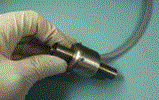APEX Medical introduces blood pressure sensor technology

APEX Medical, Inc. recently announced that it has received patent approval for its flow-through blood pressure sensor that, the company says, will provide the enabling technology for next-generation rotary heart assist pumps, known as a ventricular assist devices (VADs).
Patent number 6,171,253, entitled "Flat Tube Pressure Sensor," was approved by the U.S. Patent and Trademark Office earlier this month. The inventors of this breakthrough technology were APEX employees Edward Bullister, PhD and Peter d'Entremont. In addition to the U.S. patent, APEX Medical is actively pursuing similar patents in a number of other countries .
.
James Sluetz, company president and CEO, said, "We're delighted to have received the patent. The long term success of implantable VADs depends on their being able to self-regulate, and our direct blood pressure sensor provides that capability."
The APEX Medical blood pressure sensor uses physiological inputs from the body to control the speed of rotary pumps on which most next-generation VADs depend. Until now, VADs have had to rely on indirect control parameters, such as motor current, to regulate pump performance. Sluetz said direct pressure measurement is a more precise way to monitor and control pumps that are implanted in the body.
APEX Medical, which successfully completed initial animal tests on its pressure sensor last year, is currently working with selected VAD manufacturers to incorporate its blood pressure sensor in their heart pumps.
Sluetz also said, "We are continuing our development work, which includes applying similar technology to other implantable devices where the need to detect ultra-sensitive changes in pressure long-term is of critical importance."
The APEX Medical pressure sensor, made of titanium, was developed, in part, with financial support from the National Institute of Standards and Technology/Advanced Technology Program.
Used to treat congestive heart failure by working alongside a weakened heart, a VAD helps pump blood from the left ventricle. The APEX Medical pressure sensor enables rotary VADs to auto-regulate by directly and continuously measuring blood pressure as an input to a closed-loop control system. This, in turn, lets VADs adjust their pumping rates in response to patient activity levels and perfusion needs.
Five million Americans currently suffer from congestive heart failure (CHF) and 550,000 more are diagnosed with the disease each year. With only about 2,500 hearts available each year in the U.S. for transplant, heart assist pumps are seen as the most viable method of treating the millions of people, in the U.S. and abroad, who suffer from CHF.
Source: BW HealthWire
